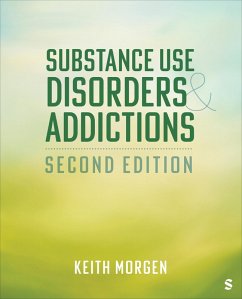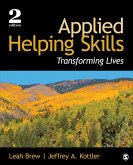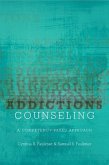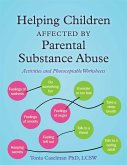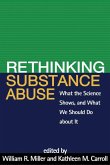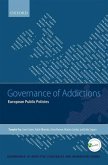Keith J Morgen
Substance Use Disorders and Addictions
Schade – dieser Artikel ist leider ausverkauft. Sobald wir wissen, ob und wann der Artikel wieder verfügbar ist, informieren wir Sie an dieser Stelle.
Keith J Morgen
Substance Use Disorders and Addictions
- Broschiertes Buch
- Merkliste
- Auf die Merkliste
- Bewerten Bewerten
- Teilen
- Produkt teilen
- Produkterinnerung
- Produkterinnerung
Experienced researcher and clinican Keith Morgen summerizes cutting-edge research into an applied introduction in Substance Use Disorders and Addictions, Second Edition. Updated with the DSM-5-TR¿s diagnostic criteria, Morgen provides a holistic approach to treating individuals with addiction and co-occurring psychiatric disorder.
Andere Kunden interessierten sich auch für
Experienced researcher and clinican Keith Morgen summerizes cutting-edge research into an applied introduction in Substance Use Disorders and Addictions, Second Edition. Updated with the DSM-5-TR¿s diagnostic criteria, Morgen provides a holistic approach to treating individuals with addiction and co-occurring psychiatric disorder.
Produktdetails
- Produktdetails
- Verlag: Sage Publications
- 2nd edition
- Seitenzahl: 368
- Erscheinungstermin: 9. Oktober 2024
- Englisch
- Gewicht: 624g
- ISBN-13: 9781071885086
- ISBN-10: 1071885081
- Artikelnr.: 70540320
- Herstellerkennzeichnung
- Libri GmbH
- Europaallee 1
- 36244 Bad Hersfeld
- gpsr@libri.de
- Verlag: Sage Publications
- 2nd edition
- Seitenzahl: 368
- Erscheinungstermin: 9. Oktober 2024
- Englisch
- Gewicht: 624g
- ISBN-13: 9781071885086
- ISBN-10: 1071885081
- Artikelnr.: 70540320
- Herstellerkennzeichnung
- Libri GmbH
- Europaallee 1
- 36244 Bad Hersfeld
- gpsr@libri.de
Dr. Keith Morgen is a tenured Professor of Counseling and Director of the Graduate Counseling Programs at Centenary University where he is a prior recipient of the Distinguished Teaching Award. Dr. Morgen is the author of over 40 scholarly articles and book chapters in the areas of trauma, older adult mental health care, prison-based mental health/addiction issues, and co-occurring substance use and mental health disorders. In addition to Substance Use Disorders and Addictions, Dr. Morgen is also the co-author of the book Aging Behind Prison Walls: Studies in Trauma and Resilience (Columbia University Press) which was the 2022 recipient of the Society for Social Work and Research National Book Award. Dr. Morgen is the current President of the New Jersey Addiction Professionals Association (NAADAC affiliate), a member of the NAADAC older adult standards of care committee, and a former President of the International Association of Addictions and Offender Counselors (a division of the American Counseling Association). Dr. Morgen is a Licensed Professional Counselor (New Jersey), Approved Clinical Supervisor, and operates a counseling practice with clients diagnosed with co-occurring substance use/addiction and mental health disorders.
1. Substance Use Disorder and Addiction: Basic And Brief
Psychopharmacological and Neuropsychological Review
Central Nervous System
Brain Areas Associated With Substance Use and Addiction
Psychopharmacology: Basics
Interface Between Substance Use, Neuropsychology, and Psychopharmacology:
Basic Considerations
Closing Thoughts
Conclusion and Questions to Consider
I. CLINICAL CASES OVERVIEW
Case of Samantha
Case of Debra
Case of Warren
2. Interview, Screening, and Assessment
Purpose of Interviewing, Screening, and Assessment
Components of the Interview
Assessment
Questions to Consider as You Move On to Chapter 3
3. Diagnostic Issues
DSM-5-TR Overview for Substance Use and Related Disorders
Co-Occurring Disorders
Process Addictions
The COVID-19 Pandemic and Addiction/Co-Occurring Disorders
Questions to Consider as You Move On to Chapter 4
4. Treatment Modalities and Client Placement
Withdrawal Management
Inpatient Treatment
Outpatient Treatment
Establishing the Appropriate Level of Care
Social Justice and Cultural Considerations for Effective SUD Treatment
Affordable Care Act and Medicaid Expansion
Drug Courts
Questions to Consider as You Move On to Chapter 5
II. REVIEW
Samantha
Debra
Warren
Legal, Ethical, and Curricular Issues in SUD Screening, Assessment, and
Treatment Placement
5. Motivational Interviewing
MI Goals
MI Spirit
Engaging
Preparatory Change Talk
Planning
Ready for Change
Consistency of MI Research Findings
Culturally Appropriate Applications
Questions to Consider as You Move On to Chapter 6
6. Cognitive Behavioral Therapy
Cognitive Behavioral Therapy (CBT) Basic Elements
Cognitive Model of Substance Use
Examples of Some CBT Techniques
Rational Emotive Behavior Therapy (REBT)
CBT Effectiveness
Questions to Consider as You Move On to Chapter 7
7. Family Counseling Interventions
Basic Family Counseling Concepts
Bowenian Theory
The Addicted Family
Systemic Motivational Therapy (SMT)
Multidimensional Family Therapy (MDFT)
Functional Family Therapy (FFT)
Multisystemic Therapy (MST)
Questions to Consider as You Move On to Chapter 8
8. Existential Counseling
Basic Concepts of Existential Counseling Theory
Existential Anxiety, Neurotic Anxiety, and Resistance
Existential Guilt and Existential Regret
Forms of World
Ultimate Concerns
Counseling Considerations
Questions to Consider as You Move On to Chapter 9
III. REVIEW
The Case of Samantha: MI Examples
The Case of Debra: MI Examples
The Case of Warren: MI Examples
9. Recovery
The 12 Steps and Traditions
Overall Philosophy of the 12 Steps
12-Step Membership and Meeting Basics
12 Steps and Counseling
12-Step Themes
Post-Traumatic Growth and Recovery
Questions to Consider as You Move On to Chapter 10
10. Relapse Prevention
Basics of the Relapse Prevention Idea
Marlatt's Model
Dynamic Model of Relapse (Witkiewitz & Marlatt, 2004)
Mindfulness-Based Relapse Prevention (MBRP)
Matrix Model
Recovery Capital
Questions to Consider as You Move On to Chapter 11
IV. Review
Recovery and Relapse Prevention Review
The Case of Samantha: 12-Step Considerations
The Case of Debra: Recovery and PTG Considerations
The Case of Warren: Recovery Capital Considerations
11. Substance Use Disorders and Addiction Counseling: Education, Graduate
Program Accreditation, and Supervision
SAMHSA-NAADAC Addiction Professional Education and Career Ladder
Licensure
Professional Identity Debate
Models of Counseling Supervision
Supervision Models Specific for Addiction Counseling
The Three-Dimensional Existential Model of Substance Use Disorders and
Addiction
Questions to Consider as You Leave This Book
Psychopharmacological and Neuropsychological Review
Central Nervous System
Brain Areas Associated With Substance Use and Addiction
Psychopharmacology: Basics
Interface Between Substance Use, Neuropsychology, and Psychopharmacology:
Basic Considerations
Closing Thoughts
Conclusion and Questions to Consider
I. CLINICAL CASES OVERVIEW
Case of Samantha
Case of Debra
Case of Warren
2. Interview, Screening, and Assessment
Purpose of Interviewing, Screening, and Assessment
Components of the Interview
Assessment
Questions to Consider as You Move On to Chapter 3
3. Diagnostic Issues
DSM-5-TR Overview for Substance Use and Related Disorders
Co-Occurring Disorders
Process Addictions
The COVID-19 Pandemic and Addiction/Co-Occurring Disorders
Questions to Consider as You Move On to Chapter 4
4. Treatment Modalities and Client Placement
Withdrawal Management
Inpatient Treatment
Outpatient Treatment
Establishing the Appropriate Level of Care
Social Justice and Cultural Considerations for Effective SUD Treatment
Affordable Care Act and Medicaid Expansion
Drug Courts
Questions to Consider as You Move On to Chapter 5
II. REVIEW
Samantha
Debra
Warren
Legal, Ethical, and Curricular Issues in SUD Screening, Assessment, and
Treatment Placement
5. Motivational Interviewing
MI Goals
MI Spirit
Engaging
Preparatory Change Talk
Planning
Ready for Change
Consistency of MI Research Findings
Culturally Appropriate Applications
Questions to Consider as You Move On to Chapter 6
6. Cognitive Behavioral Therapy
Cognitive Behavioral Therapy (CBT) Basic Elements
Cognitive Model of Substance Use
Examples of Some CBT Techniques
Rational Emotive Behavior Therapy (REBT)
CBT Effectiveness
Questions to Consider as You Move On to Chapter 7
7. Family Counseling Interventions
Basic Family Counseling Concepts
Bowenian Theory
The Addicted Family
Systemic Motivational Therapy (SMT)
Multidimensional Family Therapy (MDFT)
Functional Family Therapy (FFT)
Multisystemic Therapy (MST)
Questions to Consider as You Move On to Chapter 8
8. Existential Counseling
Basic Concepts of Existential Counseling Theory
Existential Anxiety, Neurotic Anxiety, and Resistance
Existential Guilt and Existential Regret
Forms of World
Ultimate Concerns
Counseling Considerations
Questions to Consider as You Move On to Chapter 9
III. REVIEW
The Case of Samantha: MI Examples
The Case of Debra: MI Examples
The Case of Warren: MI Examples
9. Recovery
The 12 Steps and Traditions
Overall Philosophy of the 12 Steps
12-Step Membership and Meeting Basics
12 Steps and Counseling
12-Step Themes
Post-Traumatic Growth and Recovery
Questions to Consider as You Move On to Chapter 10
10. Relapse Prevention
Basics of the Relapse Prevention Idea
Marlatt's Model
Dynamic Model of Relapse (Witkiewitz & Marlatt, 2004)
Mindfulness-Based Relapse Prevention (MBRP)
Matrix Model
Recovery Capital
Questions to Consider as You Move On to Chapter 11
IV. Review
Recovery and Relapse Prevention Review
The Case of Samantha: 12-Step Considerations
The Case of Debra: Recovery and PTG Considerations
The Case of Warren: Recovery Capital Considerations
11. Substance Use Disorders and Addiction Counseling: Education, Graduate
Program Accreditation, and Supervision
SAMHSA-NAADAC Addiction Professional Education and Career Ladder
Licensure
Professional Identity Debate
Models of Counseling Supervision
Supervision Models Specific for Addiction Counseling
The Three-Dimensional Existential Model of Substance Use Disorders and
Addiction
Questions to Consider as You Leave This Book
1. Substance Use Disorder and Addiction: Basic And Brief
Psychopharmacological and Neuropsychological Review
Central Nervous System
Brain Areas Associated With Substance Use and Addiction
Psychopharmacology: Basics
Interface Between Substance Use, Neuropsychology, and Psychopharmacology:
Basic Considerations
Closing Thoughts
Conclusion and Questions to Consider
I. CLINICAL CASES OVERVIEW
Case of Samantha
Case of Debra
Case of Warren
2. Interview, Screening, and Assessment
Purpose of Interviewing, Screening, and Assessment
Components of the Interview
Assessment
Questions to Consider as You Move On to Chapter 3
3. Diagnostic Issues
DSM-5-TR Overview for Substance Use and Related Disorders
Co-Occurring Disorders
Process Addictions
The COVID-19 Pandemic and Addiction/Co-Occurring Disorders
Questions to Consider as You Move On to Chapter 4
4. Treatment Modalities and Client Placement
Withdrawal Management
Inpatient Treatment
Outpatient Treatment
Establishing the Appropriate Level of Care
Social Justice and Cultural Considerations for Effective SUD Treatment
Affordable Care Act and Medicaid Expansion
Drug Courts
Questions to Consider as You Move On to Chapter 5
II. REVIEW
Samantha
Debra
Warren
Legal, Ethical, and Curricular Issues in SUD Screening, Assessment, and
Treatment Placement
5. Motivational Interviewing
MI Goals
MI Spirit
Engaging
Preparatory Change Talk
Planning
Ready for Change
Consistency of MI Research Findings
Culturally Appropriate Applications
Questions to Consider as You Move On to Chapter 6
6. Cognitive Behavioral Therapy
Cognitive Behavioral Therapy (CBT) Basic Elements
Cognitive Model of Substance Use
Examples of Some CBT Techniques
Rational Emotive Behavior Therapy (REBT)
CBT Effectiveness
Questions to Consider as You Move On to Chapter 7
7. Family Counseling Interventions
Basic Family Counseling Concepts
Bowenian Theory
The Addicted Family
Systemic Motivational Therapy (SMT)
Multidimensional Family Therapy (MDFT)
Functional Family Therapy (FFT)
Multisystemic Therapy (MST)
Questions to Consider as You Move On to Chapter 8
8. Existential Counseling
Basic Concepts of Existential Counseling Theory
Existential Anxiety, Neurotic Anxiety, and Resistance
Existential Guilt and Existential Regret
Forms of World
Ultimate Concerns
Counseling Considerations
Questions to Consider as You Move On to Chapter 9
III. REVIEW
The Case of Samantha: MI Examples
The Case of Debra: MI Examples
The Case of Warren: MI Examples
9. Recovery
The 12 Steps and Traditions
Overall Philosophy of the 12 Steps
12-Step Membership and Meeting Basics
12 Steps and Counseling
12-Step Themes
Post-Traumatic Growth and Recovery
Questions to Consider as You Move On to Chapter 10
10. Relapse Prevention
Basics of the Relapse Prevention Idea
Marlatt's Model
Dynamic Model of Relapse (Witkiewitz & Marlatt, 2004)
Mindfulness-Based Relapse Prevention (MBRP)
Matrix Model
Recovery Capital
Questions to Consider as You Move On to Chapter 11
IV. Review
Recovery and Relapse Prevention Review
The Case of Samantha: 12-Step Considerations
The Case of Debra: Recovery and PTG Considerations
The Case of Warren: Recovery Capital Considerations
11. Substance Use Disorders and Addiction Counseling: Education, Graduate
Program Accreditation, and Supervision
SAMHSA-NAADAC Addiction Professional Education and Career Ladder
Licensure
Professional Identity Debate
Models of Counseling Supervision
Supervision Models Specific for Addiction Counseling
The Three-Dimensional Existential Model of Substance Use Disorders and
Addiction
Questions to Consider as You Leave This Book
Psychopharmacological and Neuropsychological Review
Central Nervous System
Brain Areas Associated With Substance Use and Addiction
Psychopharmacology: Basics
Interface Between Substance Use, Neuropsychology, and Psychopharmacology:
Basic Considerations
Closing Thoughts
Conclusion and Questions to Consider
I. CLINICAL CASES OVERVIEW
Case of Samantha
Case of Debra
Case of Warren
2. Interview, Screening, and Assessment
Purpose of Interviewing, Screening, and Assessment
Components of the Interview
Assessment
Questions to Consider as You Move On to Chapter 3
3. Diagnostic Issues
DSM-5-TR Overview for Substance Use and Related Disorders
Co-Occurring Disorders
Process Addictions
The COVID-19 Pandemic and Addiction/Co-Occurring Disorders
Questions to Consider as You Move On to Chapter 4
4. Treatment Modalities and Client Placement
Withdrawal Management
Inpatient Treatment
Outpatient Treatment
Establishing the Appropriate Level of Care
Social Justice and Cultural Considerations for Effective SUD Treatment
Affordable Care Act and Medicaid Expansion
Drug Courts
Questions to Consider as You Move On to Chapter 5
II. REVIEW
Samantha
Debra
Warren
Legal, Ethical, and Curricular Issues in SUD Screening, Assessment, and
Treatment Placement
5. Motivational Interviewing
MI Goals
MI Spirit
Engaging
Preparatory Change Talk
Planning
Ready for Change
Consistency of MI Research Findings
Culturally Appropriate Applications
Questions to Consider as You Move On to Chapter 6
6. Cognitive Behavioral Therapy
Cognitive Behavioral Therapy (CBT) Basic Elements
Cognitive Model of Substance Use
Examples of Some CBT Techniques
Rational Emotive Behavior Therapy (REBT)
CBT Effectiveness
Questions to Consider as You Move On to Chapter 7
7. Family Counseling Interventions
Basic Family Counseling Concepts
Bowenian Theory
The Addicted Family
Systemic Motivational Therapy (SMT)
Multidimensional Family Therapy (MDFT)
Functional Family Therapy (FFT)
Multisystemic Therapy (MST)
Questions to Consider as You Move On to Chapter 8
8. Existential Counseling
Basic Concepts of Existential Counseling Theory
Existential Anxiety, Neurotic Anxiety, and Resistance
Existential Guilt and Existential Regret
Forms of World
Ultimate Concerns
Counseling Considerations
Questions to Consider as You Move On to Chapter 9
III. REVIEW
The Case of Samantha: MI Examples
The Case of Debra: MI Examples
The Case of Warren: MI Examples
9. Recovery
The 12 Steps and Traditions
Overall Philosophy of the 12 Steps
12-Step Membership and Meeting Basics
12 Steps and Counseling
12-Step Themes
Post-Traumatic Growth and Recovery
Questions to Consider as You Move On to Chapter 10
10. Relapse Prevention
Basics of the Relapse Prevention Idea
Marlatt's Model
Dynamic Model of Relapse (Witkiewitz & Marlatt, 2004)
Mindfulness-Based Relapse Prevention (MBRP)
Matrix Model
Recovery Capital
Questions to Consider as You Move On to Chapter 11
IV. Review
Recovery and Relapse Prevention Review
The Case of Samantha: 12-Step Considerations
The Case of Debra: Recovery and PTG Considerations
The Case of Warren: Recovery Capital Considerations
11. Substance Use Disorders and Addiction Counseling: Education, Graduate
Program Accreditation, and Supervision
SAMHSA-NAADAC Addiction Professional Education and Career Ladder
Licensure
Professional Identity Debate
Models of Counseling Supervision
Supervision Models Specific for Addiction Counseling
The Three-Dimensional Existential Model of Substance Use Disorders and
Addiction
Questions to Consider as You Leave This Book

